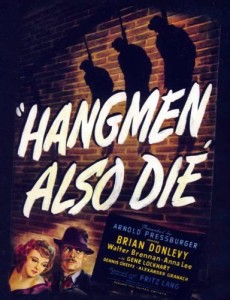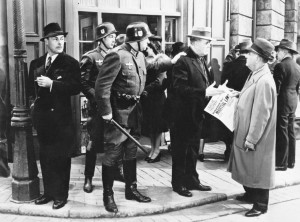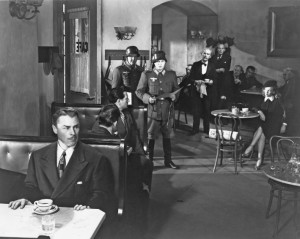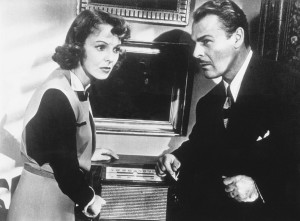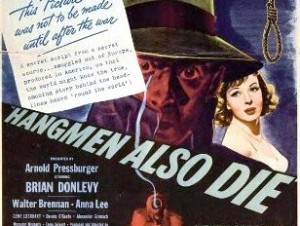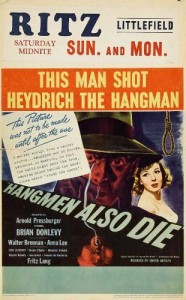Hangmen Also Die! *** (1943, Brian Donlevy, Walter Brennan, Anna Lee) – Classic Movie Review 2,637
Fritz Lang’s 1943 real-life film noir thriller film Hangmen Also Die! is based on the events of the previous year, in which the invaded country’s Nazi administrator was shot by unidentified Czech resistance fighters on 27 May 1942.
Co-writer/director Fritz Lang’s 1943 Czechoslovakia-set real-life film noir thriller film Hangmen Also Die! is based on the events of the previous year, in which the invaded country’s Nazi administrator was shot by unidentified Czech resistance fighters on May 27 1942.
The story is told in fictionalised form – mostly by Bertolt Brecht in his only script for a Hollywood film. The film’s composer Hanns Eisler was Oscar nominated for his score.
The assassination of the Nazi Reichsprotektor of Bohemia/ Moravia, ‘The Hangman’ Reinhard Heydrich (Hans Von Twardowski), causes a Gestapo terror campaign, as his assassin tries to elude the Gestapo and struggles with his impulse to give himself up while hostages are executed in the subsequent reprisals taken by Nazi occupation forces.
Brian Donlevy stars as Dr Franticek Svoboda / Karel Vanek, the killer who is shielded from the Nazis, though meanwhile several innocent citizens die. The resistance then frame a traitorous quisling Emil Czaka (Gene Lockhart), whom the Germans kill as the assassin in order to save face.
Unfortunately Lang doesn’t direct with his usual sureness of touch. The movie is strangely melodramatic and the details are surprisingly unconvincing. But there is still much to recommend it. The performances still shine through: Walter Brennan’s performance as the professor Stephen Novotny, Margaret Wycherly as his wife Ludmilla, Anna Lee as their daughter Masha and Dennis O’Keefe as Jan Horak.
Also important on the plus side are James Wong Howe’s striking black and white cinematography and Lang’s patent concern and sincerity in telling the story at this crucial point in history.
Also in the cast are Anna Lee, Dennis O’Keefe, Alexander Granach, Margaret Wycherly, Nana Bryant, Lionel Stander, Jonathan Hale, Byron Foulger, Virginia Farmer, Ludwig Donath, Sarah Padden, William Farnum, Reinhold Schuenzel [Reinhold Schünzel] and William Haade.
Lang brought in Berthold Brecht to help him write the script only 10 days after the events, but writer John Wexley was given the sole credit for the screenplay. Brecht was denied screenplay credit by the Writers Guild of America, even though he worked closely with Wexley on the project. Wexley gave evidence to the Writers Guild that Brecht and Lang had only worked on the story, and, since only Wexley’s name appeared on all the screenplay drafts, the Writers Guild jury had to rule in his favour.
This was one of the films the House Un-American Activities Committee labelled subversive because they alleged it contained dialogue that might be construed as pro-communist. Wexley was blacklisted and the film was not seen again in the United States until the mid-1970s.
Hangmen Also Die! was Bertold Brecht’s only comparatively successful Hollywood project. His earning allowed him to write The Visions of Simone Marchand, Schweyk in the Second World War and his adaptation of John Webster’s The Duchess of Malfi.
The working titles were No Surrender and Never Surrender, but a book with a similar title was published during production and producers held a contest to choose a new title. A film company production secretary won $100 for the winning title.
The real Heydrich was assassinated by Czech resistance fighters parachuted from a British plane in Operation Anthropoid. But the film, made before the full story was public knowledge, shows Heydrich’s killer as a member of the Czech resistance with ties to the Communist Party.
The cast are Brian Donlevy as Dr Franticek Svoboda, Walter Brennan as Prof. Stephen Novotny, Anna Lee as Mascha Novotny, Gene Lockhart as brewer Emil Czaka, Dennis O’Keefe as Mascha’s fiancé Jan Horak, Nana Bryant as Mrs Hellie Novotny, Hans Heinrich von Twardowski as Reinhard Heydrich, Margaret Wycherly as Ludmilla Novotny, Tonio Selwart as Chief of Gestapo Kurt Haas, Alexander Granach as Gestapo Inspector Alois Gruber, Reinhold Schünzel as Gestapo Inspector Ritter, William Roy as Beda Novotny, Jonathan Hale as Dedic, Sarah Padden as Mrs Dvorak, Byron Foulger as Bartos, Ludwig Donath as Gestapo Inspector Schirmer, Arno Frey as Camp Lieutenant, Edmund MacDonald as Dr Pillar, Lester Sharpe as Rudy, Arthur Loft as General Votruba, George Irving as Necval, James Bush as Pescacek, Lionel Stander as a taxi-driver, Virginia Farmer, William Farnum, and William Haade.
Its world premiere was on 27 March 1943 in Prague, Oklahoma, where Adolf Hitler, Hirohito and Mussolini were hanged in effigy on Main Street. The mayors of Washington, Kansas; of London, Texas; and of Moscow, Texas attended. Czech immigrants founded the city, and named it after the Czech capital.
The film opened in the US nationwide in the first days of April, starting in 20 key cities. It was nominated for two Academy Awards, for Hanns Eisler for Best Music, Scoring of a Dramatic or Comedy Picture and for Jack Whitney of Sound Services Inc for Best Sound, Recording.
Brecht was blacklisted by movie studio bosses and left the United States immediately after testifying before the House Un-American Activities Committee and Wexley was blacklisted after he was named as a communist in HUAC hearings. Lionel Stander was blacklisted after his Communist Party membership was revealed during hearings of the HUAC.
Brecht testified before the HUAC that he had never been a member of the Communist Party on 30 October 1947. The remaining witnesses, the Hollywood Ten, refused to testify and were cited for contempt. Brecht’s decision to appear before the committee led to accusations of betrayal. He returned to Europe the day after his testimony.
Hans Heinrich von Twardowski had appeared in the The Cabinet of Dr Caligari (1920). Alexander Granach had acted in Nosferatu (1922) and Kameradschaft. George Irving directed 35 silent films and acted in 251 movies from 1914 to 1948.
Hanns Eisler also wrote the song ‘No Surrender’, with lyrics by Sam Coslow. Eisler was Brecht’s collaborator on a number of plays with music. Eisler only worked on a few American films, including Deadline at Dawn (1946) and None But the Lonely Heart (1944), for which he was also nominated for an Oscar.
© Derek Winnert 2015 Classic Movie Review 2,637
Check out more reviews on http://derekwinnert.com

